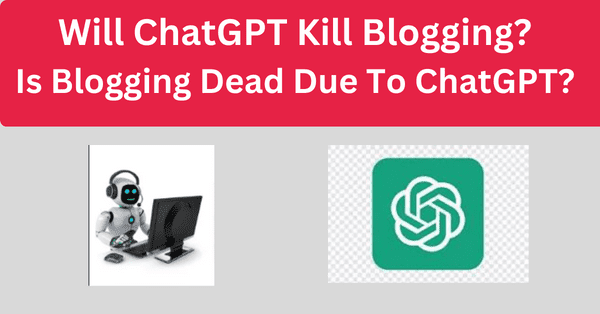In this Article, We discussed some important questions that arise in our mind about Blogging and AI Chatgpt. That is, Will ChatGPT Kill Blogging? Is it still Profitable? Is it worth blogging in 2024? Can Google detect AI blogs?
So In this article, we try to answer these questions very diligently according to 2024. Let’s start the Article.

Will ChatGPT Kill Blogging?
No, ChatGPT does not kill blogs. ChatGPT and AI technology can produce better results. Blogging offers a personal touch and unique ideas that AI alone cannot replicate.
Bloggers bring their experience, insight and creativity to their content that connects deeply with readers.
Many readers also appreciate the honesty and expertise that bloggers provide. So rather than replacing a blog, ChatGPT can complement it by helping bloggers search for, comment on, and even respond to content.
Can AI replace bloggers?
AI can help bloggers by providing feedback, research support, and even useful information. However, it is not possible to replace bloggers completely.
While AI can deliver content, it may lack the personal touch, unique voice and creativity that online humans bring to work. Readers often appreciate the honesty, expertise, and unique ideas that bloggers contribute.
Additionally, bloggers often engage with their audiences, respond to feedback, and build communities around their content; This is something human AI cannot replicate.
So, while AI can complement and support bloggers, it cannot completely replace them.
Is blogging still profitable after ChatGPT?
Yes, blogging can still be profitable even with ChatGPT and AI technology. While these AI tools can produce better content, they cannot replace the value that human bloggers bring. Successful bloggers often build a loyal audience that appreciates their unique ideas, skills, and writing style.
They can spend their money through different channels, such as advertising, sponsorships, marketing, selling digital products or providing services such as coaching or advice.
Moreover, bloggers can use AI tools to increase their productivity, simplify their work and provide feedback, thus increasing their profits. So, although artificial intelligence changes the nature of blogs, it does not eliminate their benefits.
Is blogging dead due to ChatGPT?
No, blogging is not dead due to ChatGPT. While ChatGPT and similar AI technologies can generate content efficiently, they do not eliminate the value that human bloggers provide.
Blogging is still alive and thriving because it offers a platform for individuals and businesses to share their unique perspectives, expertise, and insights with an audience.
Bloggers can connect with readers on a personal level, build communities, and establish themselves as authorities in their respective niches.
Additionally, blogging provides opportunities for monetization through various channels such as advertising, sponsored content, affiliate marketing, and selling products or services.
While AI can be a helpful tool for bloggers, it does not replace the authenticity, creativity, and human connection that blogging offers.
Is there a future in blogging?
Absolutely, there’s a bright future in blogging. Despite the rise of various content formats and platforms, blogging remains a powerful medium for sharing information, expressing creativity, and building communities. As long as people seek valuable, engaging content, there will be a demand for blogs.
Furthermore, blogging continues to evolve with technological advancements and changes in audience preferences. Integrating multimedia elements, leveraging social media, and optimizing for search engines are just a few ways bloggers adapt to stay relevant. Additionally, niche blogging allows for targeted content catering to specific interests, attracting dedicated audiences.
Moreover, blogging offers numerous opportunities for monetization, including advertising, sponsored content, affiliate marketing, and selling digital products or services. As long as bloggers provide valuable content and engage with their audience, there will be potential for success and growth in the blogging sphere.
What is the future of blogging after AI?
The future of blogging after the integration of AI holds both challenges and opportunities. AI technologies like ChatGPT can streamline content creation processes, assisting bloggers with generating ideas, conducting research, and even drafting initial content.
However, this doesn’t mean that human bloggers will become obsolete. Instead, bloggers may increasingly collaborate with AI tools to enhance their productivity and creativity. They can leverage AI-generated insights to produce more targeted and engaging content, reaching broader audiences and deepening connections with readers.
Furthermore, AI can help bloggers analyze data and trends, optimize content for search engines, and personalize user experiences, leading to more effective and impactful blogging strategies.
Ultimately, while AI may change the landscape of blogging, it’s unlikely to replace the human element entirely. Authenticity, creativity, and personal connection are qualities that AI can’t replicate, and these will continue to be valued by audiences.
As such, the future of blogging post-AI may involve a symbiotic relationship between human bloggers and AI technologies, resulting in even more dynamic and compelling content experiences.
Is it worth blogging in 2024?
Absolutely, blogging is still worth it in 2024. While the digital landscape continues to evolve, blogging remains a valuable platform for sharing ideas, knowledge, and experiences. Here’s why:
1. Audience Engagement: Blogging allows you to connect with your audience on a personal level, building trust and loyalty over time. Engaged readers are more likely to share your content, participate in discussions, and become customers or clients.
2. Authority Building: Consistent blogging establishes you as an authority in your niche. By sharing your expertise and insights, you can position yourself as a thought leader, attracting opportunities for collaborations, speaking engagements, and media features.
3. SEO Benefits: Fresh, high-quality content is essential for search engine optimization (SEO). Blogging provides a platform to regularly publish new content, improving your website’s visibility and driving high-quality organic traffic to your blog over time.
4. Monetization Opportunities: Blogging offers various avenues for monetization, including advertising, sponsored content, affiliate marketing, digital product sales, and offering services like coaching or consulting.
5. Flexibility and Creativity: Blogging allows you to express yourself creatively and explore topics that interest you. You have the flexibility to experiment with different formats, styles, and topics to keep your content fresh and engaging.
6. Long-term Asset: Each blog post you publish becomes a long-term asset that continues to attract visitors and generate leads over time. As your blog archive grows, so does your online presence and authority.
While the digital landscape may evolve, the fundamentals of blogging—providing value to your audience, building relationships, and establishing your presence online—remain as relevant as ever. So yes, blogging is definitely worth it in 2024.
Will AI Replace Content Creators?
AI has the potential to assist and enhance the work of content creators, but it’s unlikely to fully replace them. Here’s why AI does not replace Content creators in future.
1. Creativity and Originality: While AI can generate content based on existing patterns and data, it often lacks the creativity and originality that human content creators bring to their work. Content creators can think outside the box, infuse their unique voice and perspective into their content, and come up with fresh ideas that resonate with their audience.
2. Emotional Intelligence: AI may struggle to understand and convey complex human emotions, nuances, and cultural contexts effectively. Content creators can leverage their emotional intelligence to create content that connects with audiences on a deeper level, evoking empathy, inspiration, or humour.
3. Adaptability and Contextual Understanding: Content creation often requires understanding the current cultural, social, and political context. Human content creators can adapt their content to suit changing trends and audience preferences, ensuring relevance and engagement. AI may struggle to grasp subtle shifts in context or societal norms.
4. Brand Authenticity and Voice: Content creators play a crucial role in shaping and maintaining a brand’s authenticity and voice. They understand the brand’s values, tone, and audience preferences, ensuring consistency across all content channels. While AI can assist in content creation, it may not fully capture the essence of a brand’s identity.
5. Complexity and Creativity: AI excels at tasks that involve repetitive patterns or structured data but may struggle with tasks that require complex problem-solving or creative thinking.
Content creation often involves synthesizing information, analyzing trends, and presenting ideas in novel ways—areas where human creators excel.
In summary, while AI can streamline certain aspects of content creation and provide valuable insights, it’s unlikely to replace human content creators entirely. Instead, AI is more likely to augment and complement the work of content creators, freeing them to focus on tasks that require human creativity, empathy, and strategic thinking.
Is AI the End of Creativity?
AI is not the end of creativity; rather, it’s a tool that can enhance and amplify human creativity in various ways. While AI algorithms can generate content, music, and art, and even suggest creative ideas, they lack the depth of human emotion, imagination, and intuition.
Here’s why AI is not the end of creativity:
1. Collaborative Potential: AI can collaborate with humans, offering suggestions, generating ideas, and assisting in creative processes. Human-AI collaboration can lead to innovative outcomes that neither could achieve alone.
2. Augmentation, not Replacement: AI augments human creativity by automating repetitive tasks, providing inspiration, and expanding the possibilities for exploration. It frees up humans to focus on higher-level creative thinking and problem-solving.
3. Human Perspective and Emotion: AI lacks the lived experiences, emotions, and subjective perspectives that drive human creativity. Creativity often stems from personal experiences, emotions, and cultural influences, which are uniquely human.
4. Unpredictability and Serendipity: Human creativity is inherently unpredictable and often driven by serendipitous connections and insights. While AI can analyze vast amounts of data and identify patterns, it may struggle to replicate the spontaneous and intuitive nature of human creativity.
5. Interdisciplinary Collaboration: Creativity thrives at the intersection of different disciplines, perspectives, and domains of knowledge. AI can facilitate interdisciplinary collaboration by synthesizing diverse sources of information and suggesting novel connections.
In conclusion, while AI technology continues to advance, it’s unlikely to replace human creativity. Instead, AI serves as a tool that complements and expands the creative capabilities of humans, opening up new possibilities for exploration, innovation, and expression.
How will AI affect bloggers?
AI will affect bloggers in several ways, offering both challenges and opportunities:
1. Content Creation Assistance: AI can assist bloggers by generating ideas, conducting research, and even drafting initial content. This can help streamline the content creation process, saving time and effort for bloggers.
2. Improved SEO: AI-powered tools can analyze data, trends, and user behaviour to optimize blog content for search engines. By leveraging AI for SEO, bloggers can increase their visibility and attract more visitors to increase organic traffic to their blogs.
3. Content Personalization: AI can help bloggers personalize content for their audience based on demographic information, browsing history, and preferences. This can lead to higher engagement and a more tailored user experience.
4. Content Curation: AI algorithms can curate relevant content from across the web, allowing bloggers to easily discover and share interesting articles, videos, and infographics with their audience.
5. Monetization Opportunities: AI can assist bloggers in identifying monetization opportunities such as affiliate marketing, sponsored content, and advertising partnerships. By analyzing audience data and trends, AI can help bloggers optimize their monetization strategies for maximum revenue.
6. Competition and Content Quality: As AI becomes more prevalent in content creation, bloggers may face increased competition from AI-generated content. To stand out, bloggers will need to focus on providing high-quality, original content that adds value to their audience.
Overall, AI presents bloggers with the opportunity to enhance their productivity, optimize their content strategy, and improve the user experience for their audience.
Can Google detect AI blogs?
Yes, Google can detect AI-generated content, including blogs created with the assistance of AI tools. Google’s algorithms are continuously evolving to identify and assess the quality of content based on various factors such as relevance, originality, and user engagement.
While AI-generated content may be technically accurate and grammatically correct, Google’s algorithms also consider factors like readability, coherence, and user intent when ranking search results.
Content that lacks depth, and relevance, or fails to provide value to users may be penalized in search rankings, regardless of whether it was generated by AI or created by humans.
Additionally, Google’s algorithms are designed to detect and penalize tactics that attempt to manipulate search rankings, such as keyword stuffing, duplicate content, or low-quality backlinks.
Bloggers should focus on creating high-quality, original content that meets the needs of their audience and adheres to Google’s quality guidelines, regardless of whether AI tools were used in the content creation process.
Conclusion:
The question Will ChatGPT Kill Blogging? So, the answer to the question automatically changes after reading the article you may be sure that AI ChatGPT does not Kill Blogging and should not have any effect. AI ChatGPT does not Replace Content Creators in future. So do not forget to start a blog because Blogging is still worth it in 2024 and much more profitable.
Read More- Can a Person Become Rich by Blogging?




